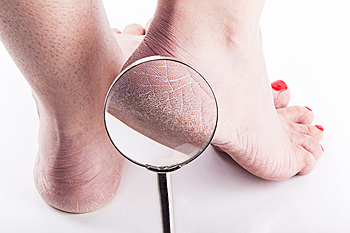 Cracked heels can be an uncomfortable foot condition. This ailment is defined as deep cracks, or fissures in the skin of the heel of the foot, and in severe cases, may cause bleeding or an infection. They can gradually develop as a result of wearing shoes that have an open back, or from medical conditions that can include eczema or psoriasis. Patients who live in dry and cold climates may frequently experience cracked heels, and it is beneficial to begin proper treatment as soon as you notice any irregularities. Treatment can consist of washing and drying the feet thoroughly, followed by applying a good moisturizer. Additionally, it may be beneficial to stay as hydrated as possible by drinking adequate amounts of water on a daily basis. If you are experiencing cracked heels for any reason, it is strongly suggested that you speak with a podiatrist as quickly as possible who can help you go over proper treatment choices.
Cracked heels can be an uncomfortable foot condition. This ailment is defined as deep cracks, or fissures in the skin of the heel of the foot, and in severe cases, may cause bleeding or an infection. They can gradually develop as a result of wearing shoes that have an open back, or from medical conditions that can include eczema or psoriasis. Patients who live in dry and cold climates may frequently experience cracked heels, and it is beneficial to begin proper treatment as soon as you notice any irregularities. Treatment can consist of washing and drying the feet thoroughly, followed by applying a good moisturizer. Additionally, it may be beneficial to stay as hydrated as possible by drinking adequate amounts of water on a daily basis. If you are experiencing cracked heels for any reason, it is strongly suggested that you speak with a podiatrist as quickly as possible who can help you go over proper treatment choices.
Cracked heels are unsightly and can cause further damage to your shoes and feet. If you have any concerns, contact Dr. John R. Northrup from Superior Foot, Ankle & Wound Care. Our doctors can provide the care you need to keep you pain-free and on your feet.
Cracked Heels
Cracked heels appear unappealing and can make it harder for you walk around in sandals. Aside from looking unpleasant, cracked heels can also tear stockings, socks, and wear out your shoes. There are several methods to help restore a cracked heel and prevent further damage.
How Do You Get Them?
Dry skin is the number one culprit in creating cracked heels. Many athletes, walkers, joggers, and even swimmers suffer from cracked heels. Age and skin oil production play a role to getting cracked heels as well.
Promote Healing
Over the counter medicines can help, especially for those that need instant relief or who suffer from chronic dry feet.
Wear Socks – Wearing socks with medicated creams helps lock in moisture.
Moisturizers – Applying both day and night will help alleviate dryness which causes cracking.
Pumice Stones – These exfoliate and remove dead skin, which allows for smoother moisturizer application and better absorption into the skin.
Change in Diet
Eating healthy with a well-balanced diet will give the skin a fresh and radiant look. Your body responds to the kinds of food you ingest. Omega-3 fatty acids and zinc supplements can also revitalize skin tissue.
Most importantly, seek professional help if unsure how to proceed in treating cracked heels. A podiatrist will help you with any questions or information needed.
If you have any questions, please feel free to contact one of our offices located in St. Augustine, and Palm Coast, FL . We offer the newest diagnostic and treatment technologies for all your foot care needs.
